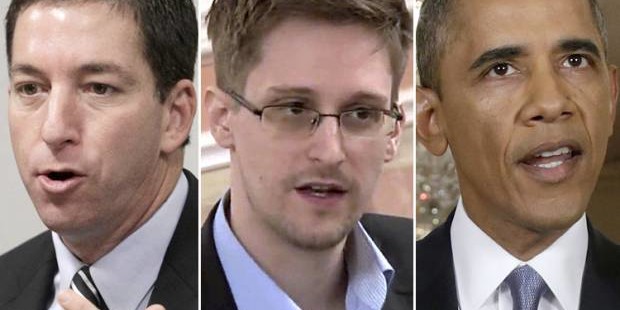
Glenn Greenwald’s heroism: Standing up to our new Orwellian police state
Empty NSA reforms will change nothing. The surveillance state subverts the law — and the president is complicit
The deed has been done, there now for all to see. President Obama’s speech on the authority of the National Security Agency confirms that Americans live — and will continue to live — in a surveillance state until they do more about it than managed so far.
A lot of good commentary has been written. Few Americans buy the ruse that the president’s promise to “reform” the institutional controls of American intelligence amounts to anything. Even the polls tell us this. Glenn Greenwald, in his Guardian column, usefully notes that this trick has made many appearances in history in the face of widespread objection: “Make the system prettier and more politically palatable with empty, cosmetic ‘reforms,’” Greenwald writes, “so as to placate public anger while leaving the system fundamentally unchanged, even more immune than before to serious challenge.”
Perfectly clear, and the historical perspective is essential to a good understanding. Now we need to investigate just what is being done. There has been a transaction; 320 million Americans are one-half of it. Of what nature, this deal?
I see two core features and then a need for taxonomy: We have to name the new thing within which we are to be submerged. To the bullets, then:
* The thought that privacy must be balanced with security is a red herring even Obama identified as such prior to taking office. The pith of the surveillance question lies in law. And we have crossed the border into Orwell country in the legal dimension.
The president invokes law without hesitation when discussing the NSA’s powers. These powers are inscribed in law, he reminded us in his speech. “It depends on the law to constrain those in power,” he said as he sought to allay fears that, for me, are far greater than any fears I am supposed to have of terrorists.
This is why I invoke Orwell. The operative laws Obama cites were concocted after the 2001 attacks by should-be white-collar criminals such as John Yoo, the White House counsel (now tenured at Berkeley Law, if you please) who gave the Bush administration legal backing for warrantless searches, wiretaps without judicial authority, Guantánamo, “renditions,” “enhanced interrogation.” Some large proportion of these laws and practices is unconstitutional when plain English prevails. So Obama’s true topic is law in the service of subverting law.
Instead of law, the ruling principle is precisely what the president insists cannot be. It is individual discretion, the stripping back of law, the shielding of prerogative from law. This has been a prominent strand in conservative American thinking since corporations began dismantling the New Deal during the Reagan era. Glass-Steagall, which regulated banking, was a notable repeal — and gave us the 2008 financial crisis. It is of a piece with the intellectual currents running beneath the surveillance policies Obama cannot now own up to they are so beyond decent.
The question of abuse becomes key in this connection. Read the speech. Obama spent an inordinate amount of his podium time protesting that there is no record of the NSA having abused its powers. This is of course radically untrue, even by official accounts. The president and the spooks have simply redefined “abuse.” See what I mean about old Orwell, about plain English?
A piece in the Times just before the speech followed Obama’s evolution — is that what it was? — from constitutional advocate to NSA defender. At the top you get the young senator and the new president asserting the supremacy of law. Then something else. “He has more information than he did then,” a former White House aide says. “And he trusts himself to use these powers more than he did the Bush administration.”
Trust cannot be a substitute for law. It cannot carry over from one administration to the next, obviously. One purpose of law is to remove the obligation to trust in these contexts. The paradox here: When Obama cites law, he has not earned public trust.
A final point in the matter of law. Theoretically postulated events cannot be invoked to justify laws or practices otherwise questionable. This way lies tragedy. We end up burning the hamlet to save the hamlet.
* The surveillance state rests upon a defective principle fated to produce undesirable consequences even as it proves ineffective. This is the practice of treating symptoms and flinching from causes. Cold War history is rich in examples. Americans took no interest in the origin of Vietnamese nationalism, only in eradicating it. No administration has concerned itself with the appetite among Americans for drugs, only in keeping it unsatisfied.
Post–Sept. 11 was a key escalation of the flinching habit. For a time there was much rumination as to why. Poverty, deprivation, political suffocation: These bred anti-Western militants as fouled pools breed mosquitoes. We needed third-world Marshall Plans. “Thinking, not vengeance,” an opinion piece in the Boston Globe urged. Remember any of this?

